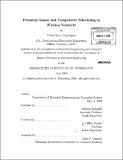Potential games and competitive scheduling in wireless networks
Author(s)
Candogan, Utku Ozan
DownloadFull printable version (10.20Mb)
Other Contributors
Massachusetts Institute of Technology. Dept. of Electrical Engineering and Computer Science.
Advisor
Asŭman Ozdaglar̀ and Pablo Parrilo.
Terms of use
Metadata
Show full item recordAbstract
This thesis studies a game theoretic model for scheduling transmissions among multiple self-interested users in a wireless network with fading. Our model involves a finite number of mobile users transmitting to a common base station under time-varying channel conditions. A distinguishing feature of our model is the assumption that the channel quality of each user is affected by global and time-varying conditions at the base station, resulting in each user observing a common channel state. Each user chooses a transmission policy that maximizes its utility function, which captures a natural trade-off between throughput and power. The transmission policy specifies how transmissions should be scheduled as a function of the time-varying common channel state observed by each user. We make three main contributions. First, we establish the existence of a Nash equilibrium of this game and characterize the set of equilibria. We investigate the efficiency properties of these equilibria, and study a related aggregate utility maximization problem, to serve as a benchmark for the performance of the equilibria. We quantify the efficiency loss in the game comparing the optimal solution of the aggregate utility maximization problem, to the best and worst equilibria in terms of the aggregate utility. We show that the performance of the worst equilibrium can be arbitrarily bad (in terms of the aggregate utility), but the efficiency loss of the best equilibrium can be bounded as a function of a technology-related parameter. Our second contribution is to study various distributed mechanisms to reach an equilibrium of this game. (cont.) We use the theory of potential games to establish convergence of such mechanisms to an equilibrium. To this end, we study conditions under which the scheduling game is a potential game. This necessitates extending the known necessary conditions for the existence of ordinal potential in games. In this thesis, we show that the scheduling game has a twice continuously differentiable ordinal potential if and only if a rate alignment condition holds. In our third contribution, we investigate the related question of characterizing the "distance" of an arbitrary game to an exact potential game. We provide a new framework based on combinatorial Hodge theory for projecting an arbitrary game to the set of exact potential games. We prove that the equilibria of a game are equilibria of its projection, where E is bounded by the projection error. Moreover, we show that the projection of a game to the set of exact potential games can be calculated using distributed consensus algorithms.
Description
Thesis (S.M.)--Massachusetts Institute of Technology, Dept. of Electrical Engineering and Computer Science, 2009. Cataloged from PDF version of thesis. Includes bibliographical references (p. 121-125).
Date issued
2009Department
Massachusetts Institute of Technology. Department of Electrical Engineering and Computer SciencePublisher
Massachusetts Institute of Technology
Keywords
Electrical Engineering and Computer Science.